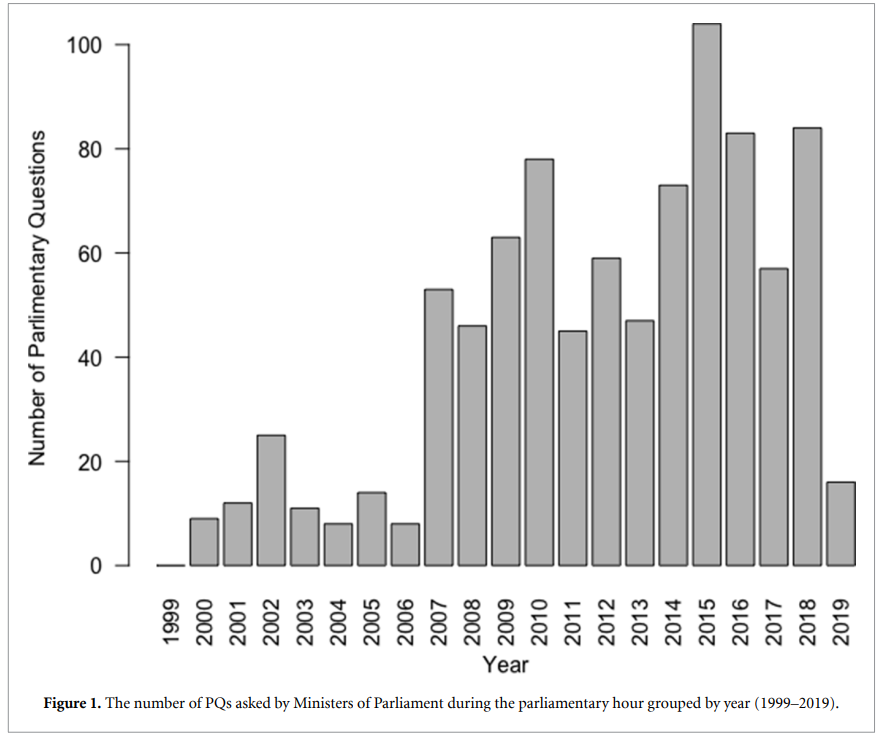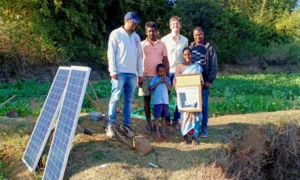India is one of the countries’ most vulnerable to climate change due to its geographic size, climatic conditions and large population, especially of vulnerable groups, and strong dependence on climate-vulnerable sectors such as agriculture for livelihoods and food security.
In the world’s largest democracy, the Indian Parliament plays a critical role in shaping Indian policies on climate change. A study titled Climate change: the missing discourse in the Indian Parliament revealed that parliamentary questions on climate change represent a very small fraction of parliamentary questions in India. This despite the importance of climate change for India’s future.
Over a 20-year period between 1999 and 2019, the study examined whether parliamentarians used questions to address climate change issues in India. A total of 895 unique parliamentary questions related to climate change were raised in this period. This formed even less than one per cent (0.3 per cent) of the total parliamentary questions asked in the Parliament.
In functioning democracies like India, parliamentary questions are a critical oversight tool that enable parliamentarians to ask questions of legislative and policy importance, and to raise issues relevant to their local constituencies.
The study also found no correspondingly high rise in the number of parliamentary questions despite the country facing extreme weather events in the 20-year period. Very few questions – only six – explored issues of socio-economic vulnerability and climate justice. This is a serious gap, noted the study published last week on July 9. The joint study was conducted by the Centre for Climate Change and Sustainability and Bengaluru based Azim Premji University.

Further, despite the fact that climate impacts are largely local, the findings indicate that members of parliament (MPs) from the most climate vulnerable states are not asking questions. As many as 1,019 MPs asked the parliamentary questions. MPs that asked the most parliamentary questions were asked from Maharashtra (181), Andhra Pradesh (105), Tamil Nadu (99), Uttar Pradesh (98), and Kerala (69), and the MPs from states that asked the least questions were Mizoram (0), Manipur, Meghalaya, and Punjab (two each).
Also Read: Digital guide to aid farmers troubled by climate change induced risks
Parliamentary questions are asked every morning, during the first hour, when the parliament is in session. During this period, members of parliament from different political parties raise questions on all matters relating to administration and government activity, which the government answers through its ministers. Ministries are also compelled to take into consideration the inputs of MPs into the law-making process, failing which, they could potentially lose the confidence of the house.
Among the questions asked in the parliament, MPs were most concerned about the impacts of climate change on agriculture, which contributes to 17 per cent of India’s GDP, the coast, and health. India’s agriculture is especially vulnerable to climate change — it is not surprising that this is an area of importance for parliamentarians, whose constituencies are largely rural, with 69 per cent of India still living outside cities in areas where agriculture is of major importance.
Also Read: Kashmir’s apple crop hit due to low rainfall and drought-like conditions
The impacts of climate change on the socially and economically disadvantaged groups of society were rarely mentioned, as were the parliamentary questions related to adaptation to climate change. The study highlighted that of the total parliamentary questions, 27.6 per cent of questions focused on impacts on climate change, 23.5 per cent on mitigation while adaptation received the least attention at 3.9 per cent. This despite the importance of climate adaptation to India.
The parliamentary questions on climate change seemed largely related to external political events. For instance, 2007 saw the sharpest increase in parliamentary questions, which was the year that preceded the launch of the National Action Plan on Climate Change. Also, the highest number of questions (104 questions) were asked in 2015 — the year that followed the renaming of the Ministry of Environment and Forests to the ‘Ministry of Environment Forests and Climate Change’.
Over the last 20 years there has been a significant rise in extreme weather events (floods, cyclones, heatwaves, cold waves) in India which has had severe impacts on human lives and livelihoods. However, the spikes in the questions did not correspond to the years that especially severe weather-related disasters occurred.
It is likely that one of the reasons for the low representation of the parliamentary questions about climate change in parliament is that climate change does not influence voting behavior, noted the study.
Also Read: Regenerative Agriculture: To benefit people, nature and climate


















